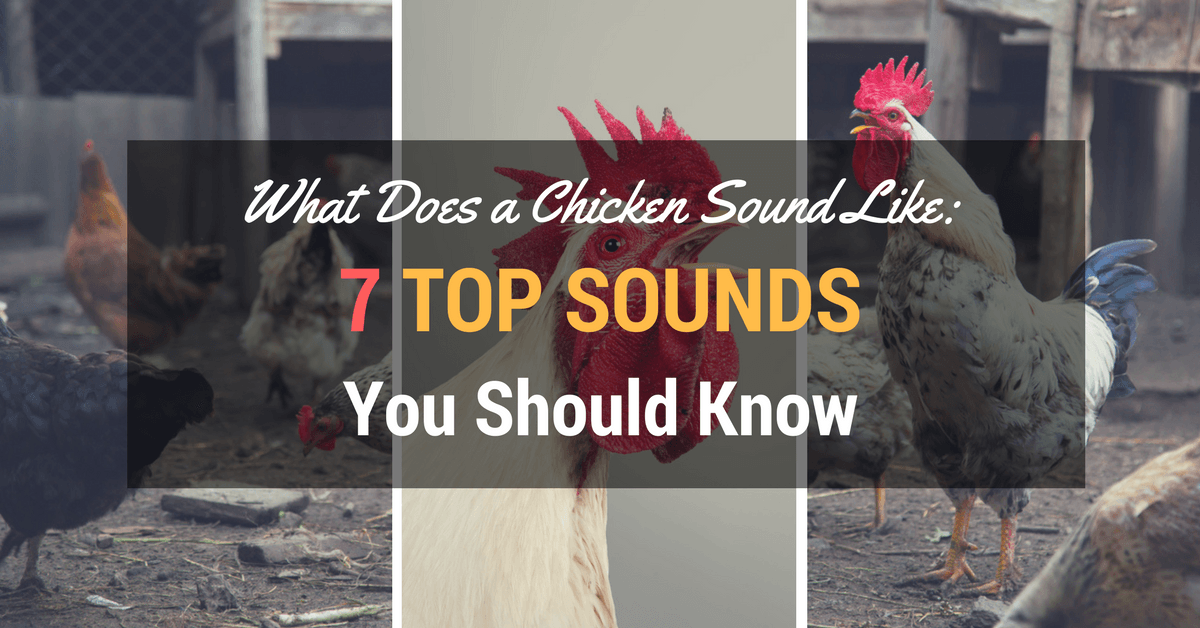What Does a Chicken Sound Like: 7 of the Top Sounds You Should Know
Have you ever wondered what does a chicken sound like? You do not need to get puzzled anymore. Research studies have proved that there are various sounds that your chicken make. Chickens do not necessarily have the vocabulary of humans because their brains don not enable them to have deep conversations. However, they still try to communicate with you. If you pay attention to the sounds they make, then you can understand them.
More...
How to Talk to Your Chicken

To speak to your fowl, you have to listen and observe what it is doing when they create a sound carefully. You have to take note that the hen will make a clucking sound to the chicks when she’s with them. Then, if you are far away from the flock, you may somewhat try to call them out. Also, these hens will somehow make warning calls.
You may not imitate them, but you can listen carefully. You may even hear the chickens making sounds when they are in trouble. But, if you call them on particular sounds, then your chicken may be capable of learning them. And surprisingly, they will respond.
Different Sounds Your Chicken Make

Baby Talks
When they make pleasure peeps, you can hear them as irregular, soft chirps. What your chickens mean is that “Hey, we’re here and all is going well.” Also, they can create distress peep. You will notice it because it is a sharp, loud tweet. It means that they are hungry, cold, or hot.Then, there is this panic peep. It is an insistent, loud peep that alarms you when the chickens need help. Next, we have the fear trill. It is a sharp yet loud noise that they repeat often. What they are telling you is not to hurt them. Lastly, the startled peep. It is a loud and sharp chirping that means they are troubled.
Mom Talks
For mom talks, you may hear your chicken makes noises. These are dull, low-pitched sounds that mean stay close to me. For food calls, they create high-pitched, short sounds of tuck-tuck-tuck. They are saying come and get the food that I found. Then, we also have the hush sound. It is a vibrating, soft sound that means the mother hens are calling their chicks. It says stays till because there is a danger.
Lady Talks
When your chicken makes a laying cackle, it may quite be annoying to the ears. It means that they are happy and proud of her eggs. Then, she wants everyone to know about it. It somewhat says she laid some eggs. Also, they can create a snakelike hiss that they accompany with fluffing feathers. It should alert you because they are mad at you and they’re saying leave them and their eggs alone.The broody growl is a harsh hiss sound. It somewhat says that leave me alone or else I will tear you down. Often, you can also hear your chickens sing using repeated notes. It means that they are happy and they want to tell you that they’re doing good.
Conversations
When you hear their contentment calls, they are dull, low-pitched sounds that roosters and hens make. What they are referring to is to stick together. Then, they also say the nesting calls. The chickens usually look for their nests. On the other hand, for roosting calls, they are low-pitched yet loud sounds that they repeat during nightfall before going to sleep.Rooster TalksFor courtship croon, chickens usually make the rumble, little sounds as they circle the hens. Then, they brush their wings on the ground. When they want to alert their surroundings with flying objects, they make a chirping sound. For crowning, they stare at you with a dirty look. It says that they are the boss.
For Predator Alerts
For caution calls, they make repeated, quick noises when they spot something dangerous. They somewhat warn you to pay close attention. Then, there is this alarm cackle. It is a constant, insistent cackle that means they sense harm. Lastly, there is the air raid. It is a loud warning call that allows the flock to run for cover.
Help Calls
For the started squawks, they are moderate loud cries for injured chickens. For distress squawks, they are repeated, loud cries when you capture them. What they mean here is to let them go.
Conclusion
You may love raising your chickens in the backyard. However, some people have a hard time communicating with them. But, you don’t need to worry at all. The sounds they make have meanings. What you just have to do is to listen, observe, and learn the chicken sounds indicated above. That way, you can understand the flock effortlessly.


